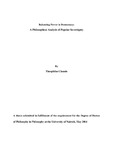| dc.description.abstract | This thesis analyses the concept of popular sovereignty as a core principle of democracy. For
centuries, democracy has been hailed as the best form of government on the assumption that
since the society is structured by the people for the sake of the people’s well-being, it is only
reasonable that the people themselves be in charge of all the processes and activities which affect
their lives. This thesis is a contribution to the larger democratic debate about power relations
between citizens and their representatives in the light of modern day representative democratic
politics. The ideal is that the people are sovereign in democracy, which is to say that the ultimate
power rests with them. In practice, however, the people do not exercise real power over their
affairs, as their representatives constantly usurp the power from them. This creates conflicts
between the people and the representatives, causing a serious problem for the realization of the
aims of democracy as a form of government. How to balance the extent to which citizens still
remain in charge of their affairs, as they continue to entrust delegates with the execution of their
decisions without risking the loss of their sovereignty, has been the main concern of this thesis.
In our opinion, the solution to the problem of the conflict between citizens and their
representatives, for a more orderly and peaceful society, depends on how the concept of popular
sovereignty is understood. In our attempt to gain an understanding of popular sovereignty, we
have employed the phenomenological and critical methods, based on pure library research. We
have found in the process, primarily, that popular sovereignty rests on some fundamental
principles, and is actualized by deliberation, publicly conducted in an environment where
members regard themselves as free and equal. What this means, ultimately, is that for popular
sovereignty to be achieved, there must be genuine efforts to instill in the citizens the principles
on which it depends, and to institutionalize deliberation as a core element in every collective
decision making at all levels of the society. Equally, there is need to impart legal knowledge to
citizens, adapted progressively according to the comprehension capacity of the learners, starting
from elementary levels of learning, until university or other tertiary levels of learning. | en_US |

